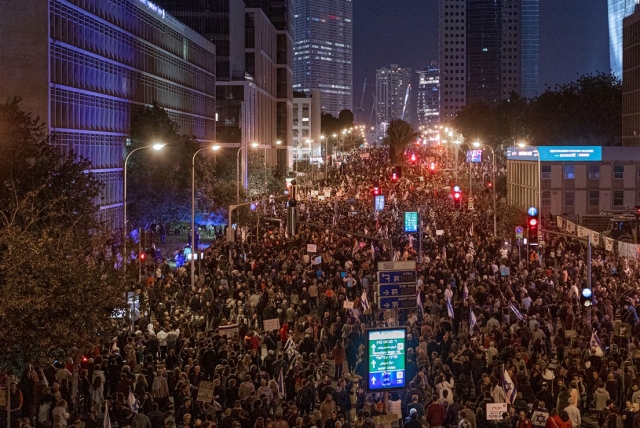The protests against the right-wing government of Benjamin Netanyahu are growing, and this time it is including people who make up the financial backbone of the economically booming Jewish State. Typically, protests are associated with the left, however this time it seems that even those on the right are unhappy with the power grab that appears to be driving Netanyahu's coalition. Last week representatives of Israel's tech and finance sectors warned that changes to the judicial structure would damage international investment and interest in the country.
The event that tipped the scales and turned a steady 80,000 protesters that had shown up in recent weeks to the record-breaking numbers seen across Israel last night, not just in Tel Aviv, was the coalition's defiance against a Supreme Court ruling that stated Shas party leader and convicted criminal, Aryeh Deri, could not be a minister. Although, it was less the ruling of the court and more the reaction the ruling got from coalition partners that seemed to be driving the numbers higher.
Poll: Majority of Israelis agree with Supreme Court disqualifying Deri https://t.co/KGpHteIvuR pic.twitter.com/v5JzMkTfBP
— אברהם יהושע כהן ,האריה Avi Barbour (@AviBarbour) January 22, 2023
In a poll conducted last week, close to 65% of Israelis agreed that Deri should play no role in the government given his two prior convictions for fraud, breach of trust, and embezzlement. The ultra-religious Shas party is needed by Netanyahu to maintain his coalition's grip on power, and last week they threatened to defy the court should it deem Deri unfit for office. This defiance as well as Twitter posts by coalition members affirming their right to ignore the court or find a workaround seem to have been the catalyst for the massive event last night.
Roy Neuman, one of the organizers of the protest against the proposed changes to the judiciary by Yariv Levin, spoke Sunday morning on the Israeli 103FM radio channel about the huge demonstration that was held in Tel Aviv Saturday night with the participation of over 130,000 protesters and tens of thousands of others in cities across Israel. He spoke about the demonstrations and the plans for their continuation and escalation.
Neuman explained that "the goal is to stop the coup d'état that will turn Israel into a dictatorship, this is our goal and we intend to reach it and we will use all possible legal tools, which means much more than demonstrations. As early as this week we will announce that we will go on shutdowns, disrupting the economy, disrupting public order. If you compared it before to the social protest that was then only demonstrations, we will resort to much more drastic measures."
About 130,000 #Israelis Gathered to Protest Judiciary Reform in Tel Aviv#TelAviv #protests #Israel #Judiciary https://t.co/3BCsOlT6wn
— TRUTH PUKE (@TruthPuke) January 21, 2023
"The protest was joined last week by people that have never, even in the past, joined protests, whether it's dozens of high-tech companies, the union of doctors, porters, all from the public sector." When asked if they were in contact with the “Histadrut" Israel’s largest union, he replied that "we are not in too many discussions with them. I do know that there are inquiries. I don't think salvation will come specifically from the Histadrut. Salvation will come from all the people (private industry) who came to the streets yesterday from the main avenue in the State of Israel and they have a lot of power. To look at it only as citizens who left is not the right thing."
He added: "We are very afraid of what is happening in the country. In the beginning, you voiced the things that David Grossman said that we are simply becoming exiles in our own country. We love this country and it is our home and we will not give it up and we will not be exiles in our country."
Over 130,000 peaceful protesters in Tel Aviv, marching in the streets in support of Democracy, and opposing the so-called Judicial reform Levin and Netanyahu are advancing that would turn Israel into a corrupt Dictatorship.
— Or-ly Barlev in English (@OrlyBarlevEng) January 21, 2023
We will never surrender our Democracy. pic.twitter.com/zmOGo9qCW5
"This government was elected for a few main things, we saw it very well this morning in the survey you presented - to take care of the cost of living, to take care of personal security, these are the things it was elected for and since it was established it has been concerned with one thing, turning Israel into a dictatorship it was not elected to make a coup d'état here. Almost no one voted for that."


